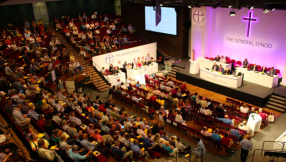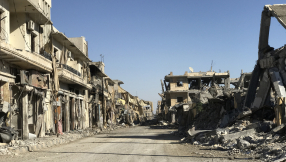Iraq reconciliation talks hit by walkouts
Hundreds of politicians gathered for the conference a day after U.S. Vice President Dick Cheney, on a visit marking the fifth anniversary of the March 2003 U.S.-led invasion, hailed what he called "phenomenal" political and security improvements.
The war has cost the United States $500 billion since it began. Tens of thousands of Iraqis have been killed and millions displaced. Almost 4,000 U.S. soldiers have also been killed in the war, a major issue in November's U.S. presidential election.
The boycott by the Sunni Arab Accordance Front, the Shi'ite bloc led by cleric Moqtada al-Sadr and smaller groups underlined that while Iraq is no longer on the verge of a sectarian civil war, there are still deep divisions between Iraq's main sects.
Shi'ite Prime Minister Nuri al-Maliki accused the groups of seeking to damage Iraq's reconciliation efforts.
"We seriously regret that others will only stand watching, and others try to bring down political progress and hamper the work of the government at a time when their patriotic duty requires them to help the government," he said.
Maliki is under pressure from Washington to reach political accommodation with opponents that will cement the fragile security gains. The gathering - held just two days before the fifth anniversary of the 2003 U.S.-led invasion - was intended to give renewed impetus to the reconciliation.
U.S. Republican presidential candidate John McCain, speaking in Jordan after visiting Iraq, said the recent buildup of U.S. troops was succeeding and any early military withdrawal would dramatically boost Iranian influence in the region.
"If we pull out of Iraq ... then obviously the Iranian influence is dramatically increased, al Qaeda has greater influence and endangers the region dramatically, and the United States' image and security challenges are dramatically increased," he said.
DISPLACED IRAQIS
Nearly one in five of Iraq's population before the U.S.-led invasion five years ago are living as internally displaced people or refugees in other countries, the International Organisation for Migration (IOM) estimated on Tuesday.
"There is very little light at the end of the tunnel in Iraq's humanitarian crisis," IOM spokeswoman Jemini Pandya told a news briefing in Geneva. "Conditions for the displaced, the refugees, have been getting steadily worse."
The situation of the 2.4 million refugees, who are mainly in Syria and Jordan, was also deteriorating, said the IOM, an independent body that cooperates with the United Nations and its humanitarian agencies.
Maliki gave an upbeat assessment at the conference, held at a convention centre in Baghdad's U.S.-protected Green Zone compound, telling delegates that Iraq was now healed and the threat of civil war was a thing of the past.
"Peace has been achieved between Sunni and Shi'ite ... the crisis when people were being killed because of their religious identity is over," Maliki told about 350 delegates, half the number invited.
Sunni Arabs, a minority in Iraq, are upset that long-held grievances remain largely unanswered and have waged a bitter insurgency. They complain of marginalisation and want greater political representation, more say in security matters and the release of thousands of Sunnis held in Iraqi prisons.
On Tuesday, Accordance Front spokesman Salim al-Jubouri complained that the bloc had not been properly invited to conference. He also said the Front decided not to attend because resolutions from other past conferences had not been acted upon.
"How can we now arrange new proposals?" Jubouri said.
The Accordance Front pulled out of Maliki's Shi'ite-led government in August. Other blocs, including Sadr's political movement, followed suit, leaving Maliki with a government of national unity in name only.













